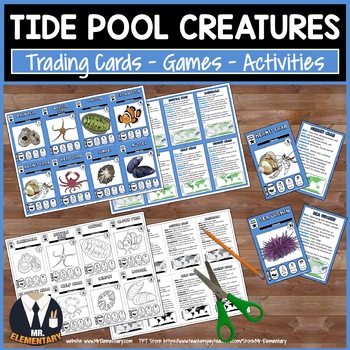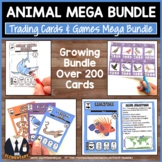Tide Pool Animal Trading Cards, Games, Activities and Projects
Mr Elementary
3.4k Followers
Grade Levels
2nd - 5th
Subjects
Resource Type
Standards
CCSS2.OA.B.2
CCSS3.OA.C.7
CCSSRI.3.10
CCSSW.3.7
CCSSSL.1.6
Formats Included
- PDF
Pages
22 pages
Mr Elementary
3.4k Followers
Also included in
- This bundle includes a total of 79 sea animal trading cards including: 12 sharks, 8 tropical fish, 8 deep sea creatures, 15 tide pool animals, 11 marine mammals and 25 animals from each of the 5 ocean zones. Each set of trading cards in this bundle includes:Filled out cards: The front of each card fPrice $9.00Original Price $15.50Save $6.50
- **Please Note** This is a growing bundle and I’m only charging you for the cards that are currently in it. As I create and add more sets of cards, you can download them for free from TPT since you’ll already own the bundle! Cards currently in this bundle: Ocean Animals: 12 sharks, 8 tropical fish8Price $25.00Original Price $49.25Save $24.25
Description
These Tide Pool Animal Trading Cards make a fun supplement to your tide pool, sea life, or ocean unit.
The 14 tide pool animals included in this set are the: Barnacle, Brittle Star, Chiton, Clown Fish, Hermit Crab, Kelp Crab, Limpet, Mussels, Nudibranch (sea slug), Periwinkle (snail), Sculpin (small fish), Sea Anemone, Sea Star, and the Sea Urchin.
This product includes:
- 14 Filled out cards: The front of each card features clipart of the tide pool animal along with its “Fast Stats” which are the top weight, length, lifespan and number of offspring of the animal. I included symbols for each of these so even prereaders will understand what the numbers mean. The backside of each card includes the tide pool animal’s: diet, habitat, predators, adaptations and a world map showing the tide pool animals’s location.
- 14 Black and white cards: These use much less ink and are fun for children to color themselves with crayons or colored pencils.
- 8 Blank trading card templates: Children can use these to create their own animal trading cards by drawing a picture of the animal on the front and writing information about it on the back.
- Foldable box and Interactive Notebook (INB) sleeve templates: Optional templates for a box or sleeve to print out, cut and fold for children to store their cards in.
Instructions for 6 games that you can play with the cards:
- Rumble in the Jungle: A collaborative discussion game
- Rumble in the Jungle 2: A Socratic Seminar game
- Complete Sentence Showdown: Students ask and answer questions about their animals using complete sentences.
- Animal Battle: A game comparing the animals’ statistics
- Math Battle War: Students use the animals’ “fast stats” to practice all 4 mathematical operations.
- Add to Your Deck: A fun writing activity where students create more animal trading cards of their own which they can use to play all the games.
- Here are a few other ideas on how to use educational trading cards:
- Educational prize box items or positive behavior incentives.
- Use them as part of a tide pool research project
- Science station, early finisher or rainy-day recess activities.
- Print these out for birthday or Christmas gifts.
Total Pages
22 pages
Answer Key
Included
Teaching Duration
N/A
Last updated Mar 31st, 2020
Report this resource to TPT
Reported resources will be reviewed by our team. Report this resource to let us know if this resource violates TPT’s content guidelines.
Standards
to see state-specific standards (only available in the US).
CCSS2.OA.B.2
Fluently add and subtract within 20 using mental strategies. By end of Grade 2, know from memory all sums of two one-digit numbers.
CCSS3.OA.C.7
Fluently multiply and divide within 100, using strategies such as the relationship between multiplication and division (e.g., knowing that 8 × 5 = 40, one knows 40 ÷ 5 = 8) or properties of operations. By the end of Grade 3, know from memory all products of two one-digit numbers.
CCSSRI.3.10
By the end of the year, read and comprehend informational texts, including history/social studies, science, and technical texts, at the high end of the grades 2–3 text complexity band independently and proficiently.
CCSSW.3.7
Conduct short research projects that build knowledge about a topic.
CCSSSL.1.6
Produce complete sentences when appropriate to task and situation.







